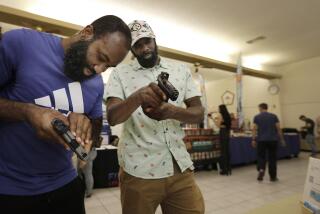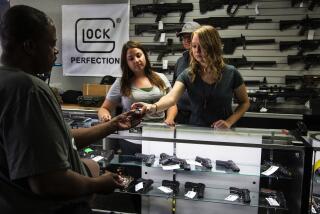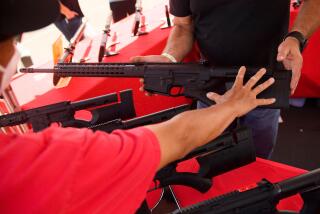Attempt to close gun show loophole has failed before
WASHINGTON — In May 1999, one month after the mass shooting at Columbine High School in Colorado, Senate Democrats triumphantly declared that the politics of gun control had changed.
An amendment to require background checks on all buyers at gun shows had just cleared the Senate in dramatic fashion: Vice President Al Gore cast the tie-breaking vote.
“It will never be the same again,” said Sen. Charles E. Schumer of New York. “The vise lock that the NRA has had on the Senate and the House is broken.”
His prediction was wildly off base: The measure was doomed.
Now, in words that echo those from 14 years ago, gun control advocates again claim momentum for tighter regulations. At the center of President Obama’s proposals is a universal background check — one that would go much further than the earlier version, requiring checks before nearly all private firearms transactions.
For the last month, a bipartisan group of senators has been working on background check legislation, but negotiations have snagged over how private sales records should be maintained. The Senate Judiciary Committee signaled Monday it would begin deliberations on gun control this week.
The failure of the post-Columbine effort underscores the challenges gun check proponents face today, following the Newtown, Conn., school shooting. Then, as now, backers believed that widespread outrage at gun violence would force Congress to act. Their optimism belies the difficulties ahead, particularly in the House.
In 1999, Republicans, largely skeptical of stricter gun laws, narrowly controlled the lower chamber, but now they hold a substantially larger margin. The National Rifle Assn., which supported more background checks after Columbine, now opposes them.
But gun control advocates have an advantage they lacked earlier. Their ranks are better organized, more politically savvy and, thanks to supporters such as New York City’s billionaire mayor, Michael R. Bloomberg, have money to compete with the NRA’s $200-million-plus annual budget.
Since the Brady bill passed in 1993, customers buying firearms from a federally licensed dealer have had to submit to a background check to ensure they are not prohibited from owning a weapon. Felons and people involuntarily committed to mental institutions are among those banned.
Checks are not required for transactions by private sellers, who do not have federal licenses and are a regular presence at gun shows. In fall 1998, President Clinton urged Congress to require background checks for these sales, to fix what had become known as the gun show loophole.
Less than six months later, Columbine reignited the debate. Eric Harris and Dylan Klebold were too young to buy the weapons they would use to kill 12 classmates and a teacher in April 1999. So they asked for help from an 18-year-old friend, who later said she chose a private seller at a gun show to avoid a background check.
“Columbine stands out as one of those horrible moments when we saw the system and its failures,” said Sen. Frank R. Lautenberg. “It was a shocking event that aroused enough indignation to say, ‘To hell with it, we’re going to do something about it.’”
The New Jersey Democrat introduced a measure to make background checks mandatory at gun shows. The process was to be identical to that for licensed sellers: Dealers check with the FBI or state law enforcement officials to see whether the buyer has a record in the National Instant Criminal Background Check System. Most checks are completed promptly, but some take longer as additional records are sought. If the FBI finds no prohibitive records after three business days, the sale is approved.
Pro-gun groups objected. Gun shows are usually held on weekends, meaning that background delays would cut into sales. But the NRA did not wholly dismiss new laws. Wayne LaPierre, the NRA’s executive vice president, said the group supported “mandatory, instant criminal background checks for every sale at every gun show.”
The NRA backed a series of Senate and House measures that would reduce the time frame from three business days to 24 hours. Gun control supporters said the deadline would hobble law enforcement, who would be unable to access records in time. The FBI estimated that, under the shorter limit, 17,000 prohibited buyers would have been able to get weapons in a six-month span.
Jim Baker, lead lobbyist for the NRA, later told the Wall Street Journal that his real goal was to block any law.
Lautenberg had the backing of six Republicans, enough to pass his measure in the GOP-led Senate if every Democrat voted for it. But two were not present and two voted no. A week later, Lautenberg’s measure was resurrected and the vote was 50 to 50. Gore, as the presiding officer in the Senate, broke the tie.
But momentum sputtered in the House. Resistance came not only from Republicans but Democrats representing conservative districts. Less than five years earlier, in the 1994 election, Republicans had routed Democrats to win control of Congress. Many Democrats blamed their losses on the assault weapons ban, which had passed that year.
Gun rights advocates capitalized on the Democratic wariness. Rep. Carolyn McCarthy of New York, who had won her seat after her husband was killed and her son severely wounded in a mass shooting, introduced the Senate measure in the House. Fellow Democrat John D. Dingell of Michigan, a former NRA board member, crafted an alternative that would have applied to far fewer gun shows and imposed the 24-hour deadline on background checks.
Dingell got more than 40 of his colleagues to support his amendment, many of them conservative Democrats from rural areas. He partnered with Majority Whip Tom DeLay (R-Texas), who convinced Republicans to vote for the measure, securing a bare-bones majority.
Then the House turned to McCarthy’s stricter amendment. Standing on a hushed House floor, fighting tears, she told her colleagues she had run for office with one mission: to help gun victims.
“This is not a game to me. This is not a game to the American people,” she said.
The House quashed her amendment by nearly 40 votes.
Dingell’s measure never became law either. The bill it was attached to was sunk by an uncommon alliance of conservative Republicans who opposed any tightening of gun laws, and gun control advocates who thought it didn’t go far enough.
McCarthy said in a recent interview that although the new goal is broader, its simplicity may help its chances.
“The gun show loophole was very complicated and our language now is … we want to have universal background checks,” McCarthy said. “It doesn’t matter where you’re going to be buying the gun.”
There are other notable differences now. The 1994 electoral losses are distant history; Democrats, with fewer rural members in their ranks, are less skittish about embracing new gun laws. In polls taken since Newtown, universal background checks have approval ratings north of 90%, a rarity in today’s divided electorate.
Perhaps most importantly, proponents are now poised to capitalize on that support. Organizing for America, Obama’s former campaign operation, has devoted its grass-roots mobilizing capabilities to the issue, and Bloomberg’s nonprofit group, Mayors Against Illegal Guns, is running a full-tilt lobbying and public relations operation.
Another Bloomberg venture, his “super PAC” Independence USA, has poured more than $2.2 million into the Democratic primary race to replace Rep. Jesse Jackson Jr., who resigned in November. In the first election since Newtown, the group is aiming to make gun laws a marquee issue, running scorching ads against two candidates with top ratings from the NRA.
“The gun lobby, unopposed, has been leading the debate,” said David Chipman, a former special agent with the Bureau of Alcohol, Tobacco, Firearms and Explosives who now works with Bloomberg’s nonprofit group. “There’s not just one voice in the room anymore.”
More to Read
Start your day right
Sign up for Essential California for news, features and recommendations from the L.A. Times and beyond in your inbox six days a week.
You may occasionally receive promotional content from the Los Angeles Times.







